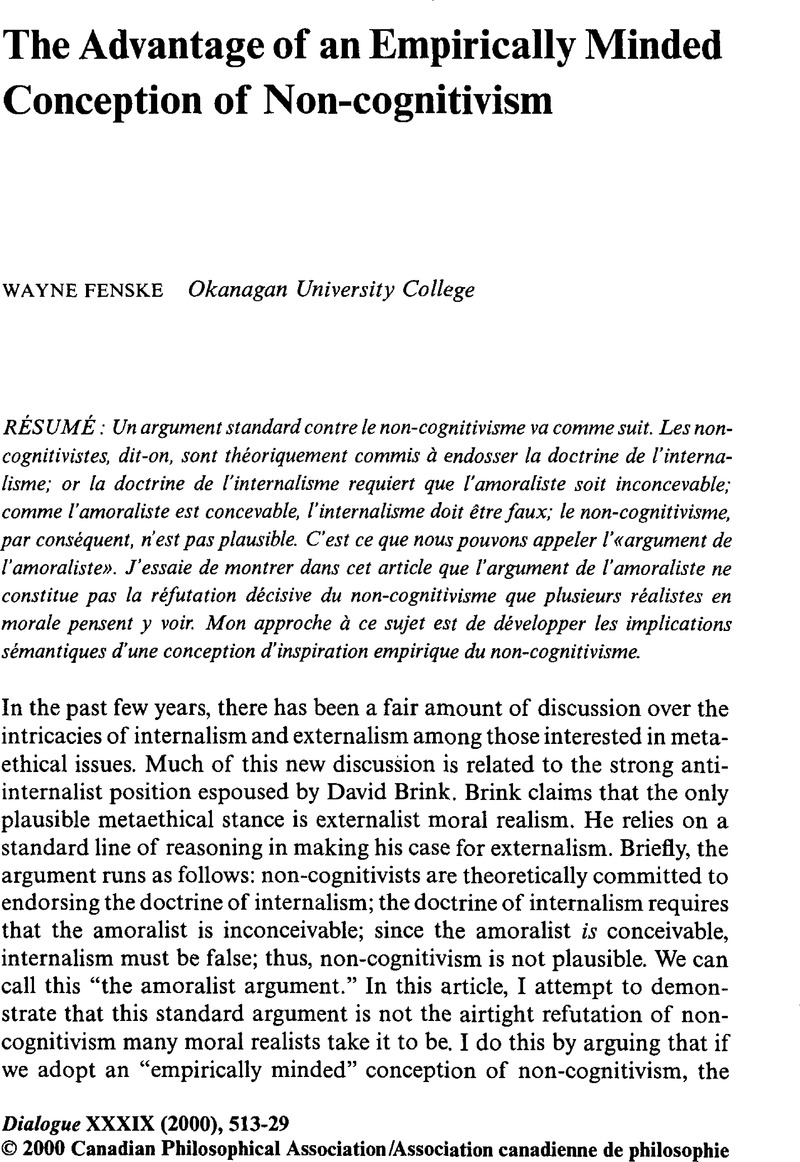Article contents
The Advantage of an Empirically Minded Conception of Non-cognitivism
Published online by Cambridge University Press: 13 April 2010
Abstract

- Type
- Articles
- Information
- Dialogue: Canadian Philosophical Review / Revue canadienne de philosophie , Volume 39 , Issue 3 , Summer 2000 , pp. 513 - 530
- Copyright
- Copyright © Canadian Philosophical Association 2000
References
Notes
1 Several contemporary authors recommend Brink's comprehensive discussion to the reader in their treatment of this issue. See, for example, Goldsworthy, Jeffrey, “Externalism, Internalism and Moral Scepticism,” Australasian Journal of Philosophy, 70 (1992): 40CrossRefGoogle Scholar; Campbell, Richmond, “Critical Notice: Allan Gibbard, Wise Choices, Apt Feelings: A Theory of Normative Judgement,” Canadian Journal of Philosophy, 23 (1993): 315CrossRefGoogle Scholar; Little, Margaret, “Moral Realism I: Naturalism,” Philosophical Books (1994): 151Google Scholar; and Copp, David, Morality, Normativity, and Society (Oxford: Oxford University Press, 1995), p. 33.Google Scholar
2 Brink, David, Moral Realism and the Foundations of Ethics (Cambridge: Cambridge University Press, 1989), pp. 40–41.CrossRefGoogle Scholar
3 Ibid., pp. 83–84.
4 Ibid., p. 42.
5 Solomon, David, “Moral Realism and the Amoralist,” Midwest Studies in Philosophy, 12 (1987): 382.Google Scholar
6 McDowell, John, “Values and Secondary Qualities,” in Essays on Moral Realism, edited by Sayre-McCord, Geoffrey (Ithaca: Cornell University Press, 1988), pp. 166–80.Google Scholar
7 McNaughton, David, Moral Vision: An Introduction to Ethics (New York: Basil Blackwell, 1988), especially pp. 39–65.Google Scholar
8 David Wiggins, “Truth, Invention, and the Meaning of Life,” in Sayre-McCord, Essays on Moral Realism, pp. 127–65.
9 At this point, I should advise the reader that I bracket off any further consideration of “British” moral realism in the discussion that follows. For an excellent short synopsis of the issues surrounding this perspective, see Little, Margaret, “Moral Realism II: Non-Naturalism,” Philosophical Books (1994): 225–33.Google Scholar
10 Brink, Moral Realism and the Foundations of Ethics, p. 46.
11 This terminology comes from Nicholas Sturgeon. In a footnote, he tells us that he got it “from a tradition among Cornell graduate students. I learned of it from Brian Penrose, whom I discovered analyzing my lectures in these terms for undergraduates” (Sturgeon, Nicholas, “What Difference Does It Make Whether Moral Realism Is True?,” The Southern Journal of Philosophy, 24 [1986]: 136).CrossRefGoogle Scholar
12 Hare, R. M., The Language of Morals (Oxford: Clarendon Press, 1952), p. 124.Google Scholar
13 Brink, Moral Realism and the Foundations of Ethics, pp. 47–48.
14 Solomon, “Moral Realism and the Amoralist,” p. 385.
15 Goldsworthy, “Exteraalism, Internalism and Moral Scepticism,” p. 45.
16 Brink, Moral Realism and the Foundations of Ethics, p. 38.
17 DePaul, Michael, “Critical Notice: Moral Realism and the Foundations of Ethics,” Philosophy and Phenomenological Research, 53 (1993): 532.CrossRefGoogle Scholar
18 For Moore's original open-question argument, see Moore, G. E., Principia Ethica (Cambridge: Cambridge University Press, 1948), pp. 5–21Google Scholar. For an explication of the theory of meaning which underlies Moore's open-question argument, see “Beliefs and Propositions,” in Moore, G. E., Some Main Problems in Philosophy (New York: Macmillan, 1953), especially pp. 258–59Google Scholar; White, A., G. E. Moore: A Critical Exposition (Oxford: Basil Blackwell, 1958), especially pp. 38–41 and 96–99Google Scholar; and Regan, Tom, Bloomsbury's Prophet: G. E. Moore and the Development of His Moral Philosophy (Philadelphia: Temple University Press, 1986), especially pp. 104–107 and 193–94.Google Scholar
19 Brink, Moral Realism and the Foundations of Ethics, p. 42.
20 This citation is from Webster's Seventh New Collegiate Dictionary.
21 Putnam, Hilary, Reason, Truth and History (Cambridge: Cambridge University Press, 1981), p. 206.CrossRefGoogle Scholar
22 Miller, Richard M., Moral Differences (Princeton: Princeton University Press, 1992), p. 164.Google Scholar
23 I thank Rich Campbell and various members of the philosophy departments at Dalhousie University and the University of Manitoba for helpful comments on earlier versions of this paper.
- 2
- Cited by




